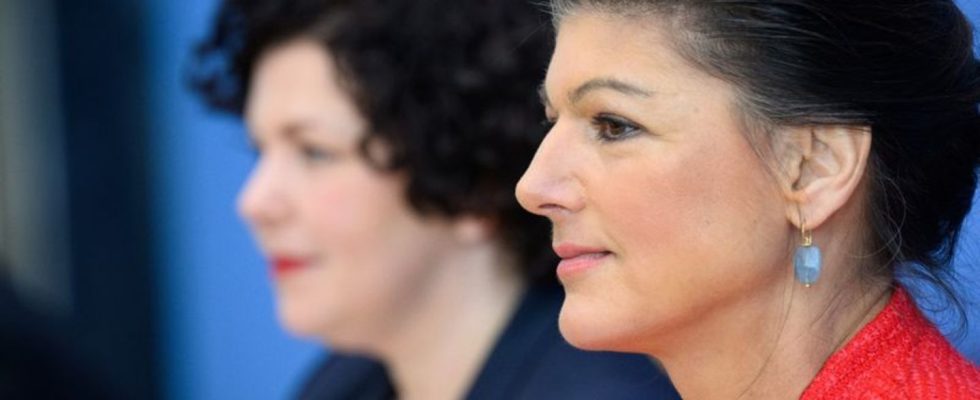Sunday question
Survey sees voter potential for Wagenknecht party
The Bundestag member Sahra Wagenknecht has been elected chairwoman of the Sahra Wagenknecht Alliance in a dual leadership with the former leader of the Left Party, Amira Mohamed Ali (l). photo
© Bernd von Jutrczenka/dpa
After the Sahra Wagenknecht alliance was founded, a relatively large number of Germans can imagine voting for the former left-wing politician’s party. But it could also fail because of the five percent hurdle.
A new survey sees comparatively high voter potential for the newly founded Sahra Wagenknecht (BSW) alliance. 4 percent of those surveyed for the ZDF “Politbarometer” said they definitely wanted to vote for the party in the next federal election, and 17 percent probably wanted to do so. This emerges from a current representative survey by the Elections Research Group.
On the other hand, 27 percent would probably not vote for the BSW and 47 percent would definitely not. The survey looks at supporters of the left and AfD has above-average potential to vote for the Wagenknecht party.
The BSW formed as a party on Monday. The Bundestag member Sahra Wagenknecht has been elected chairwoman in a dual leadership with the former leader of the left-wing faction, Amira Mohamed Ali.
In the survey, 1,337 randomly selected eligible voters were interviewed by telephone and online from January 9th to 11th. In an Insa survey for “Bild” in December, the BSW came to 12 percent nationwide. Since the party had not yet been formally founded at the time and the program was unknown, the results were associated with particular uncertainties.
SPD only at 13 percent
When asked which party the respondents would vote for if there were a federal election next Sunday, 13 percent answered SPD (-1). This means that the Chancellor’s party achieved the lowest value in this legislative period in the ZDF “Politbarometer”. The Union has 31 percent (-1), the Greens remain at 14 percent, as in the previous month. 4 percent chose the FDP (-1). The AfD remained unchanged at 22 percent in the survey, the Left at 4 percent.
The satisfaction ratings for the federal government reached their lowest point in the survey. Accordingly, 69 percent of those surveyed believe that the traffic lights do a poor job. 27 percent confirm that the federal government is doing its job rather well. 67 percent were dissatisfied with Chancellor Olaf Scholz. Only 28 percent of respondents said he was doing a good job.
Election surveys are generally subject to uncertainty. Among other things, weakening party ties and increasingly short-term voting decisions make it more difficult for opinion research institutes to weight the data collected. In principle, surveys only reflect the opinion at the time of the survey and are not predictions of the election outcome.

